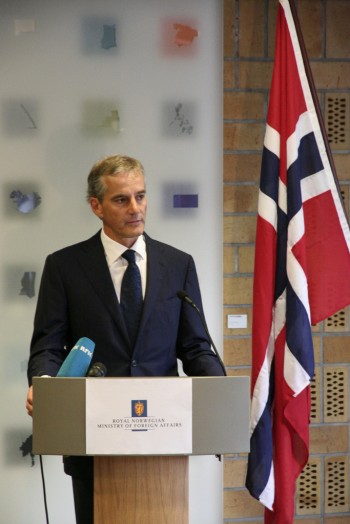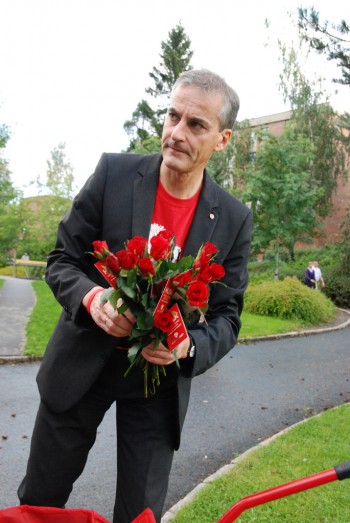NEWS ANALYSIS: Labour Party leader Jonas Gahr Støre faced what some commentators, even in the pro-Labour press, were calling “catastrophic” public opinion polls as he gathered 300 party members for their important annual national meeting this weekend. Støre desperately needs to rally his troops and fend off too much compromise if he’s to succeed at becoming Norway’s next prime minister.

Polls issued this week have confirmed that Labour (Arbeiderpartiet, Ap) has lost voters every month since October. Newspaper Dagsavisen, which used to be called Arbeiderbladet and still supports the Labour Party, went so far as to call the poll results “catastrophically poor” as Labour dipped to 28.9 percent of the vote in a recent one conducted for TV2. If that had been an election result, it would be the worst in modern times for the party that has long been Norway’s largest.
What’s worse, for both Støre and his party, is that research suggests many of Labour’s voters are defecting to the much more conservative Center Party, making it a rival as well as a potential partner in a new left-center government coalition. All indications are that Labour and Center will team up, like they did from 2005 to 2013, to form a majority and replace Prime Minister Erna Solberg’s current conservative coalition if they do well enough in the parliamentary election this fall.
While Labour has been losing voters, Center has been on what many call a “populistic” roll, jumping from just 5.5 percent of the vote at the last election in 2013 to around 11 percent now. The Center Party’s resurgence, fueled by some voters’ fears of wolves and reforms, may even give Labour and Center a majority on their own, without having to invite any of Norway’s other small parties into the fold.
Støre in a squeeze
That, however, can put an uncomfortable squeeze on Støre and his Labour fellows who themselves fear that the Center Party will demand too much influence. Labour’s chapter in Moss urged the party this week to take a firmer stance on rural issues (known as “district politics” in Norway) so that Center can’t take credit for everything from boosting farm subsidies and protectionism to shooting more wolves.
At the same time there are many Labour Party members and voters who don’t back all the protectionistic policies demanded by Center, who want to protect wolves instead and even encourage proposed reforms of everything from agriculture to local governments that Center fears. One longtime political observer and public relations expert, Hans Geelmuyden, claimed that Labour is no longer creating policies for the future.
“Labour is at its best when it fights for its own reform policies,” Geelmuyden told Dagsavisen. “They’re not doing that now. The reason is that they see themselves in another coalition government with the Center Party, which is fundamentally reactionary and thinks that everything was better in the past than it is now. They’re holding Labour back and robbing Labour of its own identity.”

That’s tough criticism for Støre, who served as a highly respected and future-oriented foreign minister in Jens Stoltenberg’s Labour-led government that ruled from 2005 to 2013. Center was part of it, too, along with the Socialist Left party (SV), but Labour was much bigger than either and had control. Now, with a smaller Labour and much bigger Center, Støre faces having to make major compromises in Labour policy to become prime minister.
Geelmuyden argues that Labour “stopped making its own policies” during Stoltenberg’s second term, to appease its coalition partners, and has never cranked back up. “In an alliance with the Center Party, it seems like Labour doesn’t dare to develop its own reform policies,” Geelmuyden said.
Arne Strand, political commentator for Dagsavisen, also criticizes Labour for being “nearly invisible” in Parliament during its past three-and-a-half years in opposition and for failing to clarify its positions on issues now. The Center Party has been driving the surge towards a change of government, Strand wrote on Thursday, not Labour, and that puts Labour at a disadvantage.
Kjetil B Alstadheim, the award-winning political columnist for newspaper Dagens Næringsliv (DN), is critical as well. He notes that Labour, for example, supported local government reform during the 2013 election campaign. Now Støre is echoing the Center Party’s anti-reform rhetoric, even threatening to reverse any forced municipal mergers made between now and the election if he and Center win. Alstadheim pointed out several other issues where Labour has adopted Center’s policies and, not least, the irony of that: “Jonas Gahr Støre predicts the election will bring change. That change first and foremost is geared at changing the government itself, to stop change that may steer Norway ‘away from very important values’… because the Center Party is all about stopping change, whether it’s in the police, local government structure, defense, agriculture or hospitals.”

Støre himself, and his deputy leaders in Labour, all claim they’ve had to remain unclear about their positions on issues until they all meet this weekend to hash out their campaign platform. Støre called the meeting “a political workshop” and vowed that party positions will be clarified. Despite reports in DN on Thursday of conflicts between his two deputy leaders, Trond Giske and Hadia Tajik, Støre claimed his party was more unified than ever before and that there’s widespread agreement on the party program already worked out.
Both he and Labour Secretary Kjersti Stenseng concede that recent poll results are “too poor” for the party. “We should be bigger and have ambitions for that in election results,” Stenseng told Dagsavisen. “But when the goal is to take over government power, for which there’s majority support, it’s positive to have a strong government partner (Center).” With the other small parties losing more voters than Labour, a coalition with Center may be the only option, although Stenseng claims Labour is holding the door open. She also notes that the political agenda until now has been dominated by conflicts between Center and the current Conservatives-led government over wolves and reforms “which aren’t our core issues.”
Debate is expected at Labour’s meeting this weekend on some of those bigger core issues, like climate concerns versus the oil industry, whether to drill for oil around Lofoten and on the fate of Norway’s trade deal with the EU (the so-called EØS-agreement). Labour isn’t as polarized as it once was, though, with a left- and right-side (Støre adhered to the latter). Støre even objected on national radio Thursday morning to attempts to pit Norway’s urban areas against its rural ones, which is what Center has been doing for months.
‘Balance of power will change’
Commentator Strand predicted that Labour’s own favourite issues like job creation, health- and elder care, schools and working conditions will rise back up to the forefront, ahead of the issues for which Center has won support. “The balance of power between Labour and the Center Party will change in line with changes in the political agenda,” Strand wrote. Labour supporters can only hope that the balance of power will shift in Labour’s favour.
Støre still refuses to say, however, which other parties it may team up with if Labour and Center fail to win a majority. The two most likely are the Socialist Left (SV), which would take a Labour-Center coalition farther to the left and restrain more oil drilling, and the Christian Democrats, which would take them farther to the right. Labour veterans fear a coalition with both Center and the Christian Democrats would cause far too many conflicts on family and health issues, since both are much more conservative than Labour.
While the Labour delegates huddle through Sunday, they were mobilizing other party members to boost visibility in cities like Oslo, where around 20 stands were already being set up to spread Labour’s message. “In Oslo alone, we’re going to have more than 1,000 volunteers in action,” Siri Gåsemyr Staalesen, one of Labour’s candidates for Parliament, told Dagsavisen. “The election campaign is one of the most exciting and fun things to be found.”
newsinenglish.no/Nina Berglund

